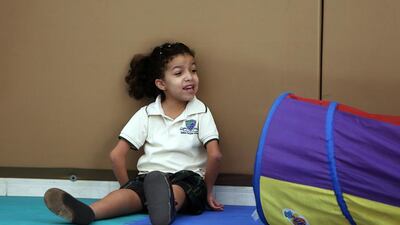DUBAI // Kenzy El Fakharany did not take her first steps until she was four years old, and they were steps that delighted her parents.
Born with a genetic disorder that locked and twisted her knees and elbows, she was never supposed to master even this basic milestone in a child’s life.
“It was a very big event in our family,” said Hisham El Fakharany, Kenzy’s 38-year-old Egyptian father.
Kenzy’s mother, Ola Said, still lights up with a smile as she recounts the joyous event three years ago when her only daughter defied the doctors’ dire expectations.
“I keep thinking, ‘Children have to walk, and to walk they have to stand first’,” said Mrs Said, a 37-year-old Egyptian who recently moved to Dubai. “So if she wants to stand, she has to strengthen her muscles.”
Mrs Said taught her daughter to stand next to household furniture and walls. She would work on strengthening her muscles, some of which have not fully developed because of the genetic disorder.
“I let her stand many hours, one hour, one hour and a half,” said Mrs Said. “Doctor told me when the time will be five minutes, she will able to walk. So, I’m trying, trying, trying.”
One day, standing close to a wall, Kenzy stood on her own for just over four minutes. “Suddenly, she walked,” said Mrs Said. “And I found her coming to me.”
Since that day Kenzy has not stopped surprising her parents and her school community at Deira Private School where she entered foundation stage two this year at the age of seven.
Mrs Said and Mr El Fakharany said the school was one of only two that would accept their daughter because of her physical condition.
“Kenzy is special because she is mentally OK, but there is problem with her physically. Private schools support mentally more than physically. When they see her, they say no, physically she is weird, we are not able to [accept her],” said Mrs Said.
Nannette Wicker-Essick, executive director of Kids First Medical Centre in Dubai, said even though laws have been enacted to protect children and adults with special needs, it is not uncommon for these students to be turned away from mainstream schools.
“Children are often not accepted in schools due to lack of provisions and facilities available within the school,” said Ms Wicker-Essick, who is also an occupational therapist.
“Examples may be lack of transportation, elevators to access to additional floors, toilets that are suitable for someone with a physical disability, proper desks, etc. It also can be lack of specialised staff to ensure the safety and well-being of the child.”
She added: “School should be accessible for all children and adaptable environments should be the standard. The gains have been substantial in this area and I look forward to more improvements as disabilities awareness increases and laws are actioned.”
Kenzy’s teacher, Kerri-Ann Jeffery, and the school’s first-stage coordinator, Clemy Fernandes, said their special student had inspired her school community by not allowing herself to be limited by her physical challenges.
“She’s very determined to do everything by herself,” said Ms Jeffery, a South African. “Obviously there are things she needs help with, but she always wants to try really, really hard first. There are things that she can do that you would look at her and you would say, ‘she can’t do that’, but she finds ways.”
In class, she joins her classmates at a table for four and holds a pencil to print her name on the construction paper. She cuts the outline of an air balloon using scissors with special handles that snap open so she only has to squeeze.
When the students are ordered to sit on the mat for Arabic class, she is lifted from her chair by her adult helper and sits supported by a wall to her left and leans her back on a book stand, her legs outstretched in front of her.
When the teacher asks questions, she is among the first to raise her elbow. Sometimes her helper, who is employed by her family to assist Kenzy in school, helps hold her hand arms higher so the teacher can see. Her arm is frequently raised.
“She is so high-spirited, nothing stops her, nothing,” said Mrs Fernandes. “Nothing is beyond her, and this is the spirit that I see in her and I’m just hoping that the world will be kinder and allow her with that spirit to just do it like everybody else.”
Despite having undergone numerous surgeries in her young life, with another one planned for June, Kenzy said that when she grows up with wants to work in medicine.
“I’d like to be a doctor,” she said. “If somebody is sick, I want to make them to be fine.”
rpennington@thenational.ae

